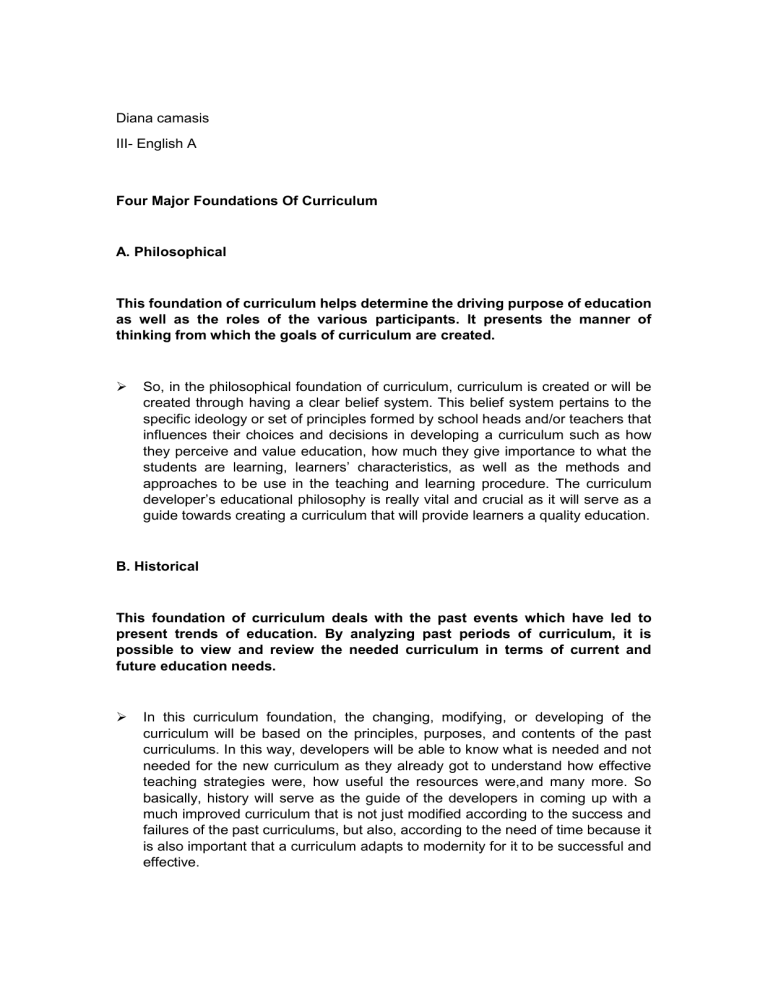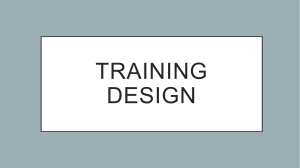Curriculum Foundations: Philosophical, Historical, Psychological, Social
advertisement

Diana camasis III- English A Four Major Foundations Of Curriculum A. Philosophical This foundation of curriculum helps determine the driving purpose of education as well as the roles of the various participants. It presents the manner of thinking from which the goals of curriculum are created. So, in the philosophical foundation of curriculum, curriculum is created or will be created through having a clear belief system. This belief system pertains to the specific ideology or set of principles formed by school heads and/or teachers that influences their choices and decisions in developing a curriculum such as how they perceive and value education, how much they give importance to what the students are learning, learners’ characteristics, as well as the methods and approaches to be use in the teaching and learning procedure. The curriculum developer’s educational philosophy is really vital and crucial as it will serve as a guide towards creating a curriculum that will provide learners a quality education. B. Historical This foundation of curriculum deals with the past events which have led to present trends of education. By analyzing past periods of curriculum, it is possible to view and review the needed curriculum in terms of current and future education needs. In this curriculum foundation, the changing, modifying, or developing of the curriculum will be based on the principles, purposes, and contents of the past curriculums. In this way, developers will be able to know what is needed and not needed for the new curriculum as they already got to understand how effective teaching strategies were, how useful the resources were,and many more. So basically, history will serve as the guide of the developers in coming up with a much improved curriculum that is not just modified according to the success and failures of the past curriculums, but also, according to the need of time because it is also important that a curriculum adapts to modernity for it to be successful and effective. C. Psychological This foundation of curriculum provides information about the teaching and learning process. It also seeks answers as to how a curriculum will be organized to achieve students’ learning at the optimum level and what amount of information they can absorb in learning the various contents of the curriculum. In this curriculum foundation, a curriculum will be designed to support the capacity and potentialities of every students. It means that it will consider how and what the students are learning. We are all aware that every students have different learning capacities, some might have a difficulty in performing or answering a task while some can easily get it done. So, it is important that the curriculum will be able to address these differences in order to improve the learning process and promote educational success for all students. D. Social This foundation of curriculum is based on conditions, problems and needs of society. It will serve as an agent for transmission of basic values of culture. Moreover, it is designed to help prepare children for the global/world society. In the social foundation of curriculum, curriculum will be designed based on the happenings in the society, as well as its culture. The principles, purposes, and contents of the curriculum will all be modified considering the social setting. School curriculum must address the changes, issues, and aspects of the society that the students’ need to know and understand. They should make the curriculum relevant to the social issues and progress so that students will be educated of the reality of the world around them.

